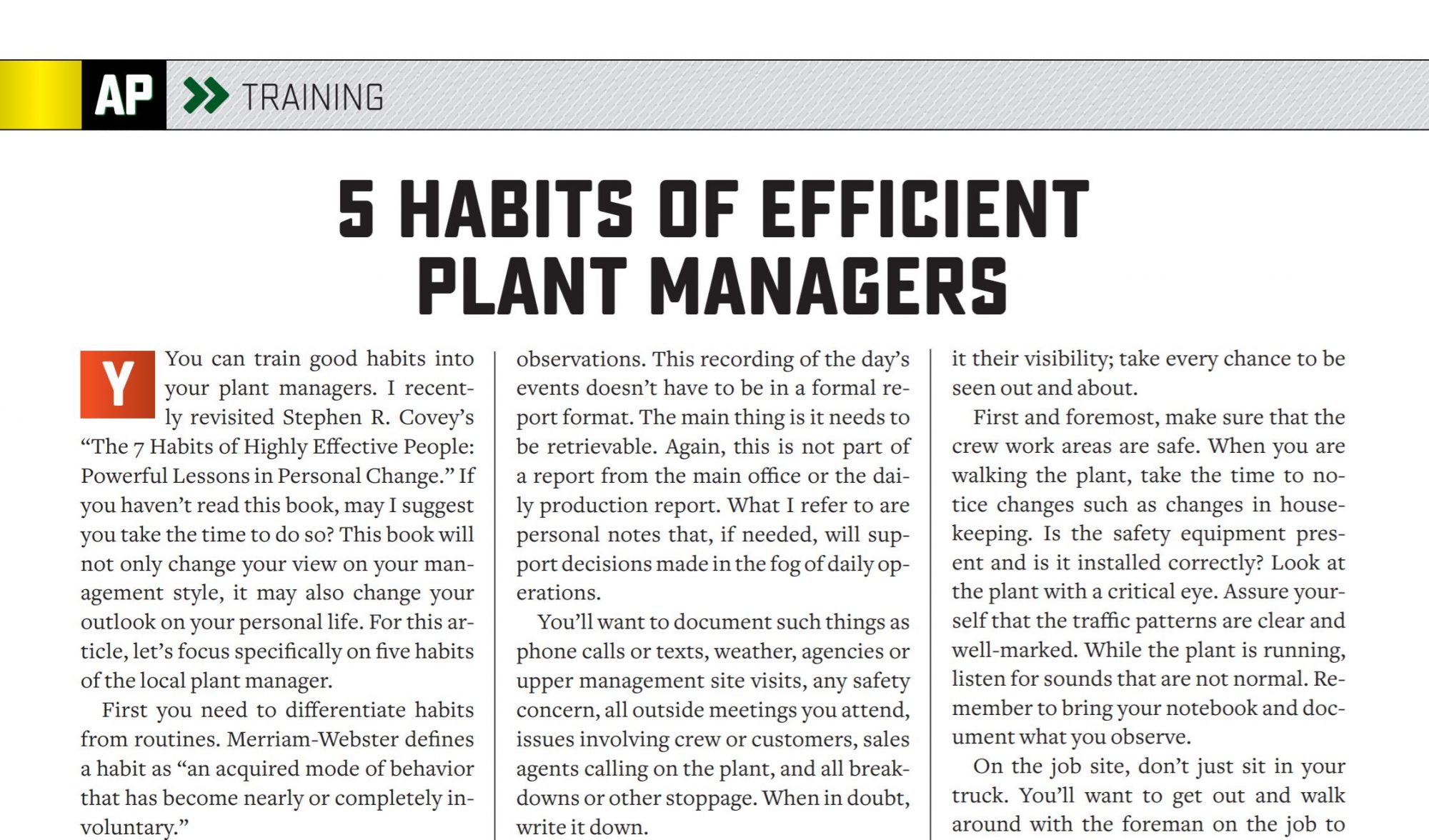5 Habits of Efficient Plant Managers
BY Ken Monlux

You can train good habits into your plant managers. I recently revisited Stephen R. Covey’s “The 7 Habits of Highly Effective People: Powerful Lessons in Personal Change.” If you haven’t read this book, may I suggest you take the time to do so? This book will not only change your view on your management style, it may also change your outlook on your personal life. For this article, let’s focus specifically on five habits of the local plant manager.
First you need to differentiate habits from routines. Merriam-Webster defines a habit as “an acquired mode of behavior that has become nearly or completely involuntary.”
In another best-selling book “The Power of the Habit,” Author Charles Duhigg makes the case for why habits exist and how they can be changed. By identifying various habits that you have developed in your daily work life you will be able to do two things:
- Identify the bad habits and change them; and
- Identify the good habits and reinforce them.
A paper published by Duke University researchers in 2006 found that more than 40 percent of the actions people performed each day weren’t actual decisions, but habits.
Finally, don’t confuse a routine for a habit. A routine may have habits built in, but it is a sequence of actions regularly followed.
Let’s look at five good habits that all local plant managers should strive towards.
1. Document
I am a big believer in documentation. In fact, plant documentation is one of my favorite subjects. Today, however, I would like to focus on personal documentation.
Everyone needs to be in the habit of documenting their actions, decisions and observations. This recording of the day’s events doesn’t have to be in a formal report format. The main thing is it needs to be retrievable. Again, this is not part of a report from the main office or the daily production report. What I refer to are personal notes that, if needed, will support decisions made in the fog of daily operations.
You’ll want to document such things as phone calls or texts, weather, agencies or upper management site visits, any safety concern, all outside meetings you attend, issues involving crew or customers, sales agents calling on the plant, and all breakdowns or other stoppage. When in doubt, write it down.
You’ll want to develop your own system of documentation. Anything from a small notebook to a formal personal daily report you complete on a tablet will do. The important aspect is it needs some type of system to make it easily retrievable.
You’ll want to have some common denominators in your documentation. In general, all documentation should have a date, time, name, point of contact information and a connection to the company. Also include a summary of discussions and any outcomes.
Time is not always on your side; try to get down as much information as possible. If needed, you can always come back and clean up your notes. I believe “documentation of your actions is the cornerstone to good plant management.”
2. Be Visible
Always be aware of your surroundings and make an attempt to be visible. At the plant, make sure the crew and others see you on the site. Walk the plant. Inspect the aggregate stockpiles, look for proper management. Talk to the drivers. Listen to the crew. Be approachable. Some plant managers have other duties that will limit their visibility; take every chance to be seen out and about.
First and foremost, make sure that the crew work areas are safe. When you are walking the plant, take the time to notice changes such as changes in housekeeping. Is the safety equipment present and is it installed correctly? Look at the plant with a critical eye. Assure yourself that the traffic patterns are clear and well-marked. While the plant is running, listen for sounds that are not normal. Remember to bring your notebook and document what you observe.
On the job site, don’t just sit in your truck. You’ll want to get out and walk around with the foreman on the job to make a note of the number of trucks on standby and mix temperature entering the hopper. The supervisor and foreman on the job will be documenting all aspects of paving, but having notes on truck cycle times and mix temperature helps your plant operator improve his performance, making this a good habit for the manager.
3. Be a Planner (be Proactive)
In every aspect of your responsibility, be proactive. I have often been accused of being too much of a planner. I wear that as a badge of honor. You can never plan too much. I say that with one caution: once you execute a plan, be flexible enough to adjust it as needed. It is often said in the Army: “A battle plan is only beneficial up to the point of the battle.”
There is no way to cover every aspect of planning in this article so we’ll cover some of the basics.
In planning for needed raw materials (inventory), you need to know your constants and your variables. The maximum amount of storage space at the plant site is one of your constants. The cycle times needed to bring in more inventory from their sources may fluctuate depending on traffic patterns and time of day. You need to know the production demand for materials in a 24-hour period. Always remember, it is a sin to run out of inventory.
Breakdowns and repairs are an area where you should be constantly planning how to respond. Documentation of a past breakdown is the starting point in your effort to plan.
Getting into the habit of writing down lessons your team learned from previous breakdowns should be the goal of every manager.
Somewhere in your files or desk should be a written inventory of all major component parts. This list will serve as a reference. The reference list can be created various ways, the important “take away” is you need one.
Major repair projects need upfront planning prior to the start. Working with sales, your regional manager, and quality control department, the plant manager can develop a major repair plan. All aspects of the project should be examined. As many “what ifs” as possible should be identified and flushed out before any components are ordered. Prior to the start of any major project, all project suppliers should be contacted. As the project gets closer, the crew should be brought into the planning phase. Analyze the project and ask the crew for comments.
4. Participate
To the best of your ability, always participate in all aspects of your job. All managers have segments of their job that they enjoy more than others, but that doesn’t give you permission to coast through the aspects you don’t enjoy.
For example, let’s say you are not big on meetings. You are in the habit of discovering ways to be excused. To overcome that situation, be prepared. Prior to the meeting, find out as much as you can about the agenda, who will be attending, and what the expectations are of you. Bring all the documentation you may need, bring your notebook, sit up straight and be ready to participate. When called on, stick to the topic at hand. Answer all questions in a simple and straightforward manner. If you don’t know an answer, don’t make one up.
Try not to interrupt others, however, be ready if called upon.
5. Lead by Leading
It’s easier said than done. Part of the job description of all managers is the ability to lead. That is not to say all managers are good leaders. It is often said that “leaders are born.” I don’t believe that statement. I believe everyone has the ability to become a good leader.
From time to time, ask yourself what you admire in the leaders around you and look for what you can learn from leaders in your circle.
Conclusion
An efficient plant manager will cultivate good habits. We all have habits, and should set a goal to enhance the positive ones while replacing the negative. I encourage you to look inward and identify some of the key habits in your daily operations. Make a list, good on one side, not so good on the other. One by one, evaluate and work to improve the habits you are not so proud of. Remember, you have the ability to change habits. If you are willing to take on this assignment, not only will upper management look at you in a different way, your output and efficiency stands to improve as well.
 Ken Monlux is an asphalt industry veteran with 30 years experience in all areas of operational management. For more information, see his ad on page xx or contact him at (209) 495-1017 or kenmonlux@yahoo.com.
Ken Monlux is an asphalt industry veteran with 30 years experience in all areas of operational management. For more information, see his ad on page xx or contact him at (209) 495-1017 or kenmonlux@yahoo.com.
